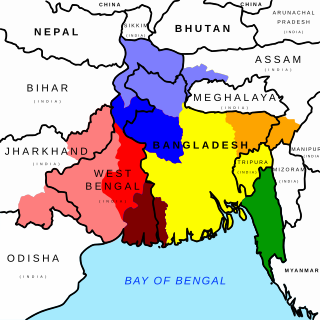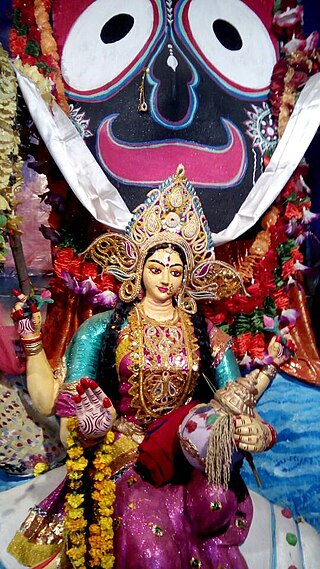
Diwali is the Hindu festival of lights, with variations celebrated in other Indian religions. It symbolises the spiritual "victory of light over darkness, good over evil, and knowledge over ignorance". Diwali is celebrated during the Hindu lunisolar months of Ashvin and Kartika—between around mid-September and mid-November. The celebrations generally last five or six days.

Hinduism is the second largest religious affiliation in People's Republic of Bangladesh, as according to the 2022 Census of Bangladesh, approximately 13.1 million people responded that they were Hindus, constituting 7.95% out of the total population of 165.15 million people. In terms of population, Bangladesh is the third-largest Hindu populated country of the world, just after the neighboring republics of India and Nepal in the subcontinent. Hinduism is the second-largest religion in 61 out of 64 districts of Bangladesh, but there is no Hindu majority district in Bangladesh.

Bangal is a term used to refer to the Bengali people of East Bengal, now in Bangladesh. The term is used to describe Bengalis from the east, who are marked by a distinct Bengali accent. It is usually assumed that the Bramhaputra-Padma river system is the demarcation line between the Western and Eastern wings of the Bengal region. The areas to the East of the Bramhaputra-Padma river system are traditionally held to be the homeland of the Bangal people.

Hooghly district is one of the districts of the Indian state of West Bengal. It can alternatively be spelt Hoogli or Hugli. The district is named after the Hooghly River.

Santipur is a city and a municipality in the Ranaghat subdivision of Nadia district in the Indian state of West Bengal. The fort area of this city, also known as Daak-Garh is thought to have been built by Raja Krishnachandra of Nadia.

Kārtika is the eighth month of the Hindu calendar, which falls in October and November of the Gregorian calendar. In India's national civil calendar, Kartika is the eighth month of the year, beginning on 23 October and ending on 21 November.

Manasa is a Hindu goddess of snakes. She is worshipped mainly in Bihar, Bengal, Jharkhand, South Assam and other parts of northeastern India and in Uttarakhand, chiefly for the prevention and cure of snakebite, and also for fertility and prosperity. In Hinduism, Manasa is the sister of Shesha and Vasuki, king of Nāgas (serpents), and wife of sage Jaratkaru. She is the mother of the sage Astika. She is also known as Vishahari, Nityā (eternal) and Padmavati.
The Halam community are various tribes native to the state of Tripura in India. The name Halam was coined by the Tipra Maharaja. As per their oral tradition they called themselves "Riam", which literally means "Human being". And lyrically they also call themselves "Riamrai, Raivon, Longvon, Chepvon etc.". The Halam are further divided into 12 sub-tribes, namely Chorai, Molsom, Hrangkhol, Kaipeng, Kalai, Ranglong, Sakachep, Thangachep, Bongcher, Korbwng, Dab and Rupini.

The Noakhali riots were a series of semi-organized massacres, rapes and abductions, combined with looting and arson of Hindu properties, perpetrated by the Muslim community in the districts of Noakhali in the Chittagong Division of Bengal in October–November 1946, a year before India's independence from British rule.

Lakshmi Puja is a Hindu occasion for the veneration of Lakshmi, the goddess of prosperity and the supreme goddess of Vaishnavism. The occasion is celebrated on the amavasya in the Vikram Samvat Hindu calendar month of Ashwayuja or Kartika, on the third day of Deepavali (Tihar) in most part of India and Nepal. In Assam, Bengal, and Odisha, this puja is celebrated five days after Vijaya Dashami.

Bagnan I is a community development block that forms an administrative division in Uluberia subdivision of Howrah district in the Indian state of West Bengal.
Bauri (Bengali:বাউরী) is a community of indigenous people primarily residing in Bengal, and considered as one of the Scheduled Castes of India. The Bauris belong to the Bhil tribe. They are usually involved in activities like farming. The Bauris of Purbo Tila Moulvibazar in Bangladesh are usually involved in medicinal practices. The prime festivals they celebrate are known as Mansa Puja, Durga Puja and Kali Puja.

Hinduism is the largest religious tradition in the Indian state of West Bengal with approximately 68% of the population identifying themselves as Hindus. The Hindus in West Bengal mostly belong to the Shakta, minority to Vaishnavite and a small community belong to Shaivite and other denominations. The vast majority of Hindus in West Bengal are Bengali Hindus numbering around 55 million and comprising 60.2% of the state population of 91.35 million (2011) but a notable section of non-Bengali Hindus also exist, particularly among Marwaris, Biharis, Odias, Gurkhas, Sindhis, Gujaratis and various tribal communities such as Koch, Santals, Munda and particularly Adivadis numbering around 9.4 million comprising rest 10.3% of the state population. Hindus have decreased in west bengal due to conversion to Islam which National Commission for Backward Classess(NCBC) notices.

Bhumij is a Munda ethnic group of India. They primarily live in the Indian states of West Bengal, Odisha, Assam and Jharkhand, mostly in the old Singhbhum district. Also in states like Bihar and Assam. There is also a sizeable population found in Bangladesh. Bhumijas speak the Bhumij language, an Austroasiatic language, and use Ol Onal script for writing.
Harmasra is a gram panchayat under Taldangra intermediate panchayat, in Khatra subdivision of Bankura district in the Indian state of West Bengal.

Bengali Hindus are an ethnoreligious population who make up the majority in the Indian states of West Bengal, Tripura, Andaman and Nicobar Islands, Jharkhand, and Assam's Barak Valley region. In Bangladesh, they form the largest minority. They are adherents of Hinduism and are native to the Bengal region in the eastern part of the Indian subcontinent. Comprising about one-thirds of the global Bengali population, they are the second-largest ethnic group among Hindus after Hindustani Hindus. Bengali Hindus speak Bengali, which belongs to the Indo-Aryan language family and adhere to Shaktism or Vaishnavism of their native religion Hinduism with some regional deities. There are significant numbers of Bengali-speaking Hindus in different Indian states. According to the census in 1881, 12.81 per cent of Bengali Hindus belonged to the three upper castes while the rest belonged to the Shudra and Dalit castes.

The Bengali Calendar or Bangla Calendar, colloquially, is a solar calendar used in the Bengal region of the South Asia. A revised version of the calendar is the national and official calendar in Bangladesh and an earlier version of the calendar is followed in the Indian states of West Bengal, Tripura and Assam. The New Year in the Bengali calendar is known as Pohela Boishakh. The calendar was introduced by Emperor Shashanka of Gauda. The rise of Shashanka from a Samanta Raja to the sovereign ruler of Bengal coincides with that of the beginning of the Bangabda.
Legislative elections were held in East Bengal between 8 and 12 March 1954, the first since Pakistan became an independent country in 1947. The opposition United Front led by the Awami League and Krishak Sramik Party won a landslide victory with 223 of the 309 seats. The Muslim League Chief Minister of East Pakistan Nurul Amin was defeated in his own constituency by Khaleque Nawaz Khan by over 7,000 votes, with all the Muslim League ministers losing their seats.
Kurumgram is an old village located in Nalhati I CD Block in Rampurhat subdivision of Birbhum district in West Bengal State of India.
Matgoda is a small town and a gram panchayat in the Raipur CD block in the Khatra subdivision of the Bankura district in the state of West Bengal, India.













